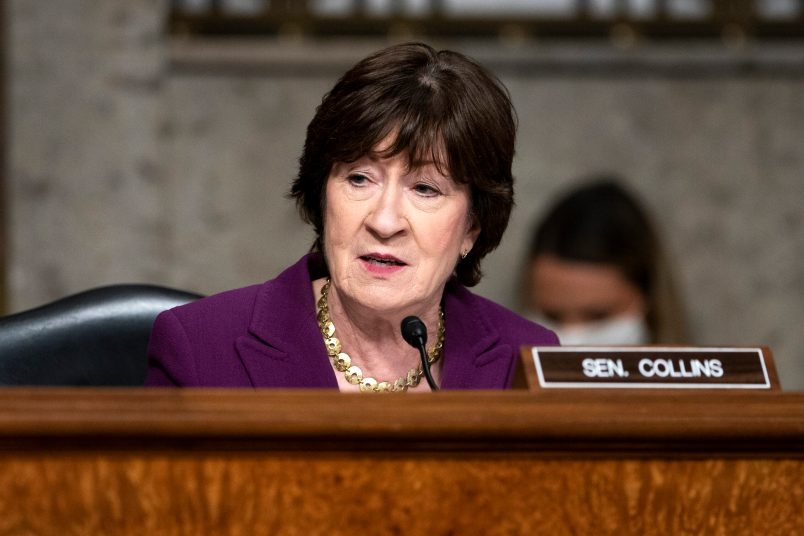Sen. Susan Collins (R-ME) on Sunday hopped on the GOP bandwagon of accusing President Biden of “politicizing” the Supreme Court nomination process after he reaffirmed his commitment to nominating a Black woman.
Appearing on ABC News, Collins said she would welcome the appointment of a Black woman to the Court and that she believes that “diversity benefits” the Court.
Collins — who was the deciding vote in Justice Brett Kavanaugh’s confirmation — then accused the President of handling the Supreme Court nomination process in a “clumsy” fashion.
“The way that the President has handled this nomination has been clumsy at best. It adds to the further perception that the Court is a political institution like Congress when it is not supposed to be,” Collins said.
After Collins said that she is “open” to whomever the President decides to nominate and that she would “evaluate the qualifications” of the nominee, Collins was pressed on why she characterized Biden’s approach to the nomination process as “clumsy.”
ABC News anchor George Stephanopoulos pointed to Senate Judiciary chair Dick Durbin‘s (D-IL) comments earlier in the program. Durbin noted that it’s not unusual for presidents, which include former Presidents Ronald Reagan and Donald Trump, to announce criteria for who they intend to nominate to the Supreme Court.
Collins pushed back at the notion that Biden has a similar approach, claiming that the difference between Biden and Trump — who pledged to nominate a woman to fill Justice Ruth Bader Ginsburg’s seat — was that Biden vowed to nominate a Black woman to the Supreme Court during his 2020 presidential campaign.
“I’ve looked at what was done in both cases. And what President Biden did was as a candidate, make this pledge. And that helped politicize the entire nomination process,” Collins said. (Collins ignored Trump’s list of potential nominees to the Supreme Court during his 2016 presidential campaign as one example.)
“What President Reagan said is, as one of his Supreme Court justices, he would like to appoint a woman,” Collins continued. “And he appointed a highly qualified one in Sandra Day O’Connor.”
After Stephanopoulos pointed to the rushed confirmation of Justice Amy Coney Barrett following the death of late Justice Ruth Bader Ginsberg as an example of a “politicized” process, Collins defended her remarks by noting that she voted against Barrett because her nomination and vacancy were too close to the 2020 presidential election.
“And Republicans just in the Obama administration had established a precedent that we were not going to confirm someone — it was Merrick Garland in that case, in an election year,” Collins said. “I did not agree with that decision, but once that precedent was established and given how close the death of the Supreme Court justice was to when the appointment was made of Justice Barrett, I felt that it was — should have been up to the next president to make the decision.”
Despite voting for Judge Ketanji Brown Jackson’s appointment to the D.C. Court of appeals, Collins wouldn’t commit to supporting her potential nomination to the Supreme Court. Jackson, who is a Black woman, is rumored to be on Biden’s shortlist of nominees.
“I’ll certainly give her every consideration. I have no idea, since she was confirmed, what rulings she’s been involved in, what writings she has done. And I have not met her personally,” Collins said.
Collins added that she appreciates Durbin reaching out to her, saying that the Senate Judiciary chair offered to make the nominee available for an “extensive interview” and to provide her with information she needs to make a decision on the nominee.
Since news broke of Justice Stephen Breyer’s retirement in the past week, Collins has not waded into the Senate deliberations to come, but has insisted that “there is no need for any rush” to replace Breyer.
“I felt that the timetable for the last nominee was too compressed,” Collins told reporters last week, referring to Coney Barrett’s nomination process during the Trump administration. “We can take our time, have hearings, go through the process, which is a very important one. It is a lifetime appointment after all.”
Meanwhile, other Republicans preemptively cast the President’s non-existent nominee to replace Breyer as someone who is part of the “Radical Left” and only got the job because she’s a Black woman. One example is Sen. Roger Wicker’s (R-MS) remarks to a local radio network over the weekend. Wicker suggested that a Black woman nominated to the Supreme Court would be a “beneficiary” of affirmative action.
Watch Collins’ remarks below:







She thought the timeline was compressed but since she was put forth by the Federalist Society -she knew it would be OK? Shameless.
He’s done what, so far, “handling it”? Said what his intentions were when making a nomination?
Right. And the Republican party has pre-announced what their intentions were for selecting nominees, save maybe color and gender–which were pretty easy to guess, for how long?
Shameless indeed, the problem is the media treats their shameless bad faith arguments at face value.
Uh, Trump was out there with a list of Federalist Society approved (white) judges in 2016, saying that he would only put judges that would overturn Roe on the SC. But, she’s concerned about the “clumsy” way Biden said that he’d add a person from a group that has never been on the SC so there was diversity. Yeah, sure.
The reality is that Republicans have politicized the process, and will continue to do so, because that is the only way they can force their Christian theocracy onto the nation. Their policies are not popular, if they honestly ran on them they would lose, so it’s their hope to install judges and ram their policies through judicial activism. Collins knows this, and she’s just fine with it…her vote against Barrett was ass covering and nothing more.
The candidates could never measure up to the Kavanaugh standard. Which was totally non-political.